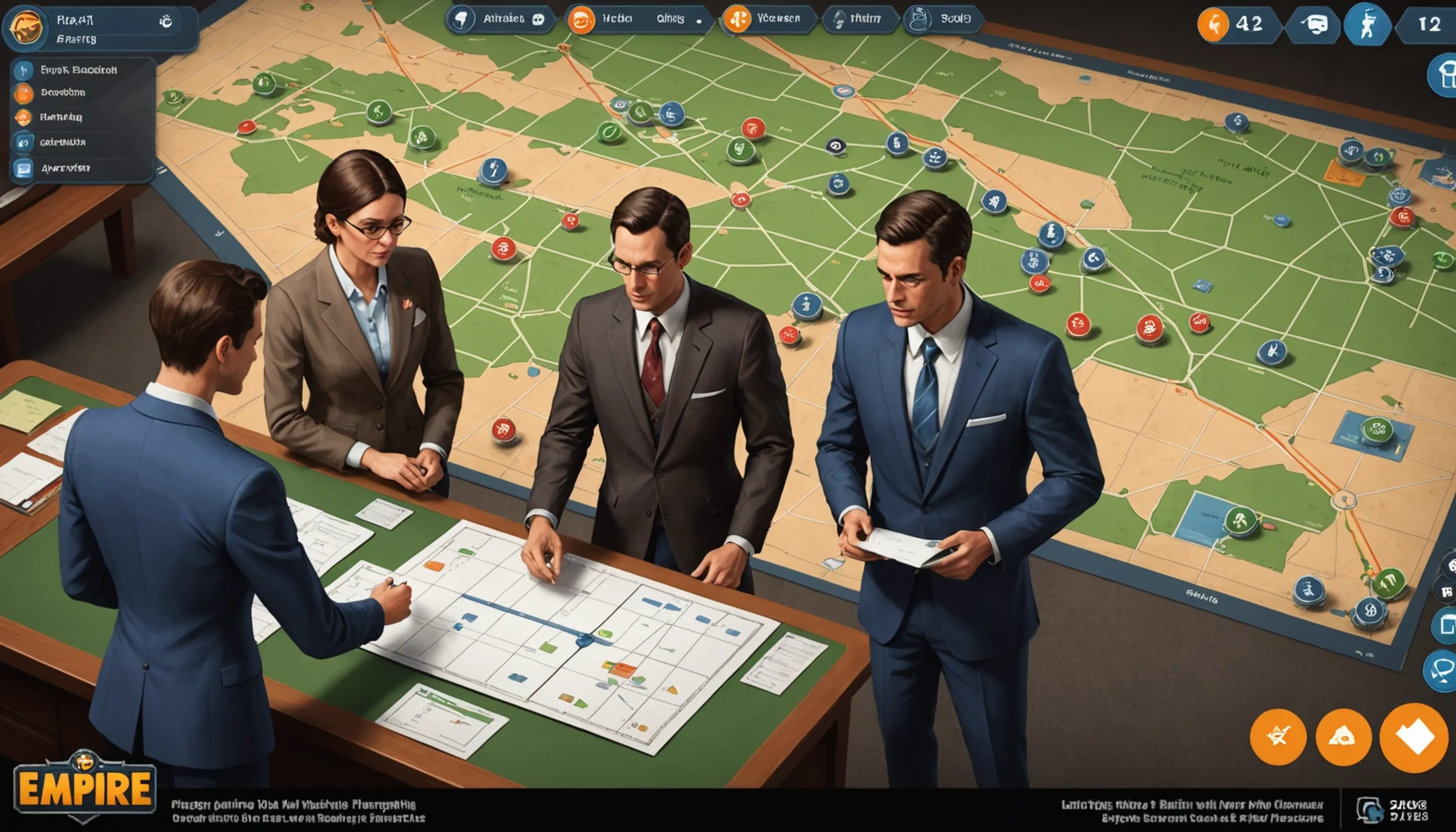Empire Builder with Math Concepts
 HvWHenry van Wagenberg
HvWHenry van Wagenberg
Understanding Empire Builder with Math Concepts
Empire Builder is an engaging way to introduce math concepts through a fun and interactive game. It allows players to build their own empires while utilizing essential math skills. By integrating mathematical concepts into gameplay, it encourages critical thinking and problem-solving.
Players must use basic operations like addition, subtraction, multiplication, and division to make decisions that affect their empire's growth. This hands-on approach helps teenagers better grasp mathematical principles while enjoying the process. As they strategize and plan their empires, they naturally enhance their math skills in a practical context.
What is Empire Builder?
Empire Builder is a popular board game that combines strategy, economics, and math in a fun and interactive way. Players take on the role of railway tycoons, aiming to build the most successful railroad empire across a map of the United States. The objective is to earn the most money by completing routes, transporting goods, and investing in various cities.
The game introduces players to essential concepts of economics and resource management. Each turn, players must make strategic decisions about where to build their tracks, how to invest their funds, and which routes to prioritize. This requires a solid understanding of both mathematical calculations and critical thinking.
Empire Builder also incorporates elements of geometry and spatial reasoning. Players must visualize their routes and consider the most efficient ways to connect cities while minimizing costs. This aspect of the game encourages players to think about distance, angles, and the physical layout of the map.
In addition to basic arithmetic, players often encounter concepts such as cost-benefit analysis when determining which investments will yield the highest returns. As they navigate the challenges of building their empire, they naturally enhance their math skills in a practical context.
Overall, Empire Builder offers an engaging and educational experience, making it an excellent tool for parents and teachers to help teenagers develop their math abilities while having fun.
How Empire Builder Incorporates Math
Empire Builder cleverly incorporates various math concepts into its gameplay, making it a valuable educational tool for teenagers. One of the primary ways it does this is through the use of basic arithmetic operations such as addition, subtraction, multiplication, and division. Players constantly calculate costs, revenue, and distances, which helps reinforce their arithmetic skills in a practical and engaging context.
As players build their railway empire, they must evaluate the financial implications of their decisions. For instance, when players decide to lay tracks or invest in a new city, they must assess the associated costs and potential profits. This process encourages them to conduct cost-benefit analyses, teaching them how to weigh the advantages and disadvantages of each choice.
Additionally, the game requires an understanding of geometry and spatial reasoning. Players must visualize routes, considering the most efficient ways to connect cities while minimizing construction costs. This aspect of the game enhances their ability to think critically about distance and layout.
Empire Builder also promotes strategic planning, as players must think several moves ahead to optimize their performance. This involves predicting opponents' actions and calculating potential outcomes based on their decisions. By blending math with strategy, the game not only makes learning enjoyable but also helps teenagers develop essential skills that extend beyond the classroom.

Practical Applications of Empire Builder in Math
Empire Builder offers numerous practical applications of math concepts in a fun and engaging manner. Players apply basic arithmetic to manage their finances, calculating costs and potential earnings as they expand their railway networks. The game encourages strategic thinking by requiring players to evaluate the best routes and investments, fostering critical decision-making skills.
Moreover, players use geometry to visualize and plan their railroads efficiently, enhancing their spatial reasoning abilities. By integrating math into gameplay, Empire Builder serves as an effective educational tool, helping teenagers reinforce their math skills in real-world contexts.
Building Structures and Geometry
In Empire Builder, players encounter various elements of building structures and geometry, which are integral to the game's strategy and mathematics. As players construct their railway empire, they must lay tracks that connect cities effectively while considering the physical layout of the game board. This process requires a firm grasp of spatial reasoning, as players visualize how their routes will intersect and overlap.
Understanding geometry becomes crucial when determining the most efficient paths to take. Players must consider factors like distance and angles, optimizing their railways to minimize costs and maximize profits. By analyzing the map, they learn to recognize shapes, patterns, and relationships between different points, which enhances their geometric skills.
Additionally, the game incorporates concepts such as perimeter and area when calculating the costs associated with building tracks. Players often need to measure distances between cities and decide where to expand their railways, which reinforces their understanding of these geometric concepts in a practical context.
Empire Builder also encourages teamwork and communication, as players often discuss their strategies and decisions with one another. This collaborative aspect fosters a supportive learning environment, allowing teenagers to share ideas and learn from each other while applying math concepts.
Overall, the integration of building structures and geometry in Empire Builder provides a rich, interactive experience that not only makes math enjoyable but also equips players with essential skills applicable in real-life situations.
Calculating Costs and Budgeting
Calculating costs and budgeting are critical components of the Empire Builder game, making it an excellent tool for teaching teenagers essential financial skills. As players expand their railroad empire, they must manage their resources wisely, ensuring they have enough funds to lay tracks, purchase trains, and invest in city developments.
Each decision a player makes involves a financial calculation. For example, when laying down new tracks, players need to determine the cost associated with connecting cities and consider whether the potential revenue from that route justifies the expense. This requires players to engage in basic arithmetic, reinforcing their skills in addition, subtraction, and multiplication as they compute the total costs of their expansions.
Moreover, players must constantly evaluate their budgets, deciding how much money to allocate to different areas of their empire. They learn the importance of resource management, as overspending in one area can lead to missed opportunities in another. This aspect of the game teaches players about opportunity costs, helping them understand the trade-offs involved in financial decision-making.
Empire Builder also encourages players to think strategically about their investments. By analyzing potential returns on different routes, they develop skills in cost-benefit analysis, a valuable financial concept. This hands-on experience helps teenagers grasp the importance of budgeting and financial planning, equipping them with skills that are applicable in real-life scenarios.
Overall, calculating costs and budgeting in Empire Builder transforms math into a practical, engaging experience that prepares teenagers for future financial responsibilities.

Using Math for Strategic Planning
Using math for strategic planning is a vital aspect of the Empire Builder game, where players must think critically and make informed decisions to build their railway empires successfully. Each move involves mathematical calculations that influence future outcomes, making it essential for players to employ various math concepts effectively.
As players analyze the game board, they must assess potential routes, calculate distances, and estimate costs associated with building tracks. This involves not only basic arithmetic but also the application of geometry to visualize and measure the most efficient paths. Players learn to identify the shortest routes and consider the implications of their choices on overall profitability.
Additionally, players engage in predictive analysis by estimating the future value of their investments. For instance, when deciding whether to expand into a new city, they must consider the potential revenue generated from transporting goods and the costs involved in developing that area. This requires a solid understanding of return on investment (ROI) calculations, encouraging players to think ahead and strategize their moves.
Empire Builder also fosters an environment of competition, as players must anticipate their opponents' actions. This aspect of the game encourages players to use game theory, analyzing not only their strategies but also considering the potential moves of others. By incorporating math into strategic planning, Empire Builder provides teenagers with valuable skills in critical thinking, problem-solving, and decision-making.
Ultimately, the emphasis on math for strategic planning in Empire Builder helps players understand the importance of informed decision-making in both gaming and real-life scenarios.
Resources for Learning Empire Builder with Math
To enhance the learning experience of Empire Builder and its integration of math concepts, there are numerous resources available for players, parents, and teachers. Books focusing on game strategies often include sections dedicated to the math skills utilized within Empire Builder, providing insights into effective gameplay and financial management.
Online courses and tutorials can also be beneficial, offering structured lessons on both the game mechanics and the mathematical principles involved. Websites like Board Game Geek feature forums where players can share tips and strategies, fostering a community of support.
Additionally, educational software and tools are available that simulate the gameplay of Empire Builder while emphasizing math concepts, making learning interactive and fun. Finally, local community centers or schools may offer game nights or workshops that focus on Empire Builder, allowing teenagers to engage with math in a collaborative environment.
Books and Online Courses
For those interested in enhancing their understanding of Empire Builder and the math concepts it incorporates, a variety of books and online courses are available. These resources not only focus on gameplay strategies but also delve into the mathematical principles that underpin effective decision-making within the game.
Books such as "The Art of Game Design" by Jesse Schell provide insights into game mechanics, including how math plays a crucial role in strategic planning. Additionally, strategy guides specifically for Empire Builder can help players understand the financial aspects of the game, offering tips on calculating costs and maximizing profits.
Online courses on platforms like Coursera and edX often include modules that cover game theory and economic principles relevant to Empire Builder. These courses typically blend theoretical knowledge with practical applications, allowing participants to see how math is utilized in real-world scenarios.
Moreover, platforms like Udemy offer specific courses that teach players how to effectively use math in board games, enhancing their gameplay experience. Many of these courses provide interactive quizzes and exercises, reinforcing the math skills required for Empire Builder.
By leveraging these books and online courses, players can deepen their understanding of both the game and the essential mathematical skills it promotes, making learning enjoyable and applicable to everyday situations.
Educational Software and Tools
In today’s digital age, numerous educational software and tools are available to enhance the learning experience of Empire Builder while reinforcing math concepts. These resources provide interactive and engaging ways for players, parents, and teachers to explore the game's mechanics and the underlying mathematics.
One popular software option is Tabletop Simulator, which allows players to simulate various board games, including Empire Builder, in a virtual environment. This platform provides an opportunity to practice gameplay strategies while incorporating math calculations in real-time. Players can experiment with different approaches to building their empires, learning from their successes and mistakes.
Additionally, programs like Math Blaster and Prodigy Math offer gamified math experiences that can complement the skills learned in Empire Builder. These tools focus on enhancing arithmetic skills, geometry, and problem-solving, making them valuable resources for reinforcing math concepts.
Furthermore, there are specific apps designed to teach concepts of game theory and economics, which relate closely to the strategic planning involved in Empire Builder. Educational platforms like Kahoot! allow users to create quizzes based on Empire Builder, encouraging friendly competition while testing math knowledge.
By utilizing these educational software and tools, players can deepen their understanding of math concepts in a fun and engaging way, ultimately improving their gameplay and analytical skills.
Community and Support Groups
Engaging with community and support groups can greatly enhance the learning experience of Empire Builder, especially when it comes to mastering the math concepts integrated into the game. These groups provide a platform for players to share strategies, tips, and resources, fostering a collaborative learning environment.
Here are some ways to get involved:
- Online Forums: Websites like Board Game Geek and Reddit have dedicated sections for Empire Builder, where players can discuss gameplay techniques and mathematical strategies.
- Social Media Groups: Platforms such as Facebook and Discord host groups where players can connect, ask questions, and participate in discussions related to Empire Builder and its mathematical components.
- Local Game Clubs: Many communities have game clubs that meet regularly to play board games. Joining one can provide opportunities to practice Empire Builder while discussing the math involved with fellow enthusiasts.
Additionally, some educational institutions offer workshops or game nights focused on board games like Empire Builder. These events often include tutorials on gameplay and math strategies, providing a hands-on learning experience.
Participating in community and support groups not only enhances one’s understanding of Empire Builder but also fosters friendships with others who share similar interests. By collaborating and sharing knowledge, players can improve their math skills while enjoying the strategic depth of the game.
